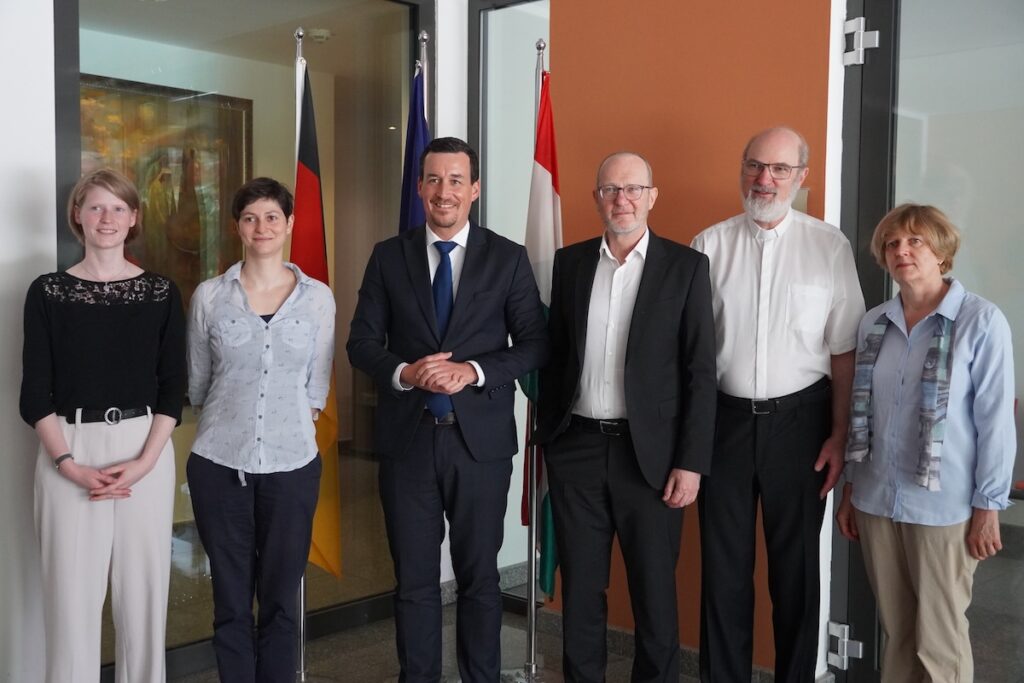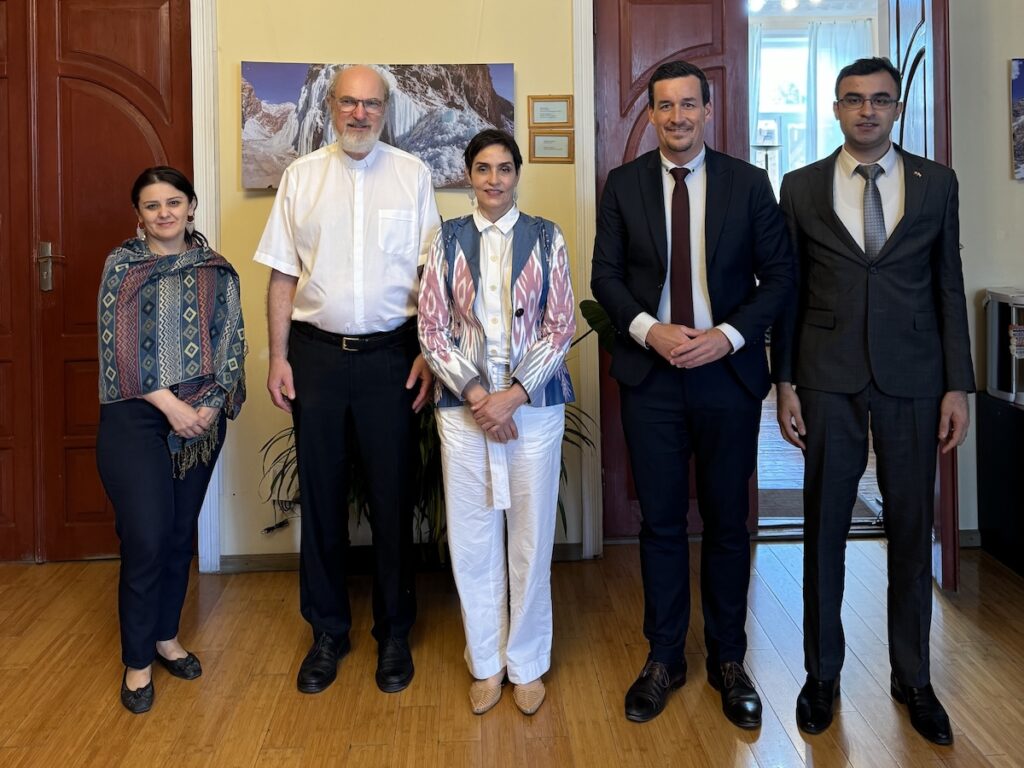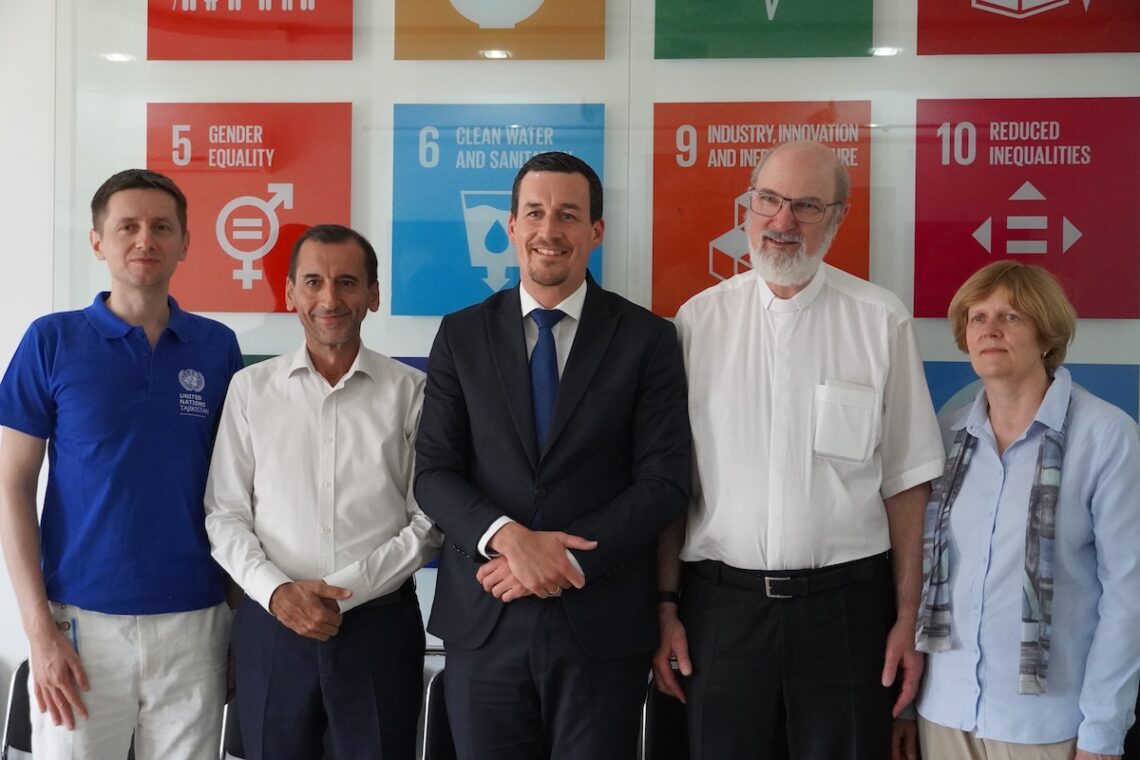(Bonn, 27.11.2024) On 11 and 12 July, the President of the International Society for Human Rights (ISHR), Prof. Thomas Schirrmacher, Prof. Christine Schirrmacher, Dr. Esther Schirrmacher and ISHR Secretary General Matthias Boehning visited Tajikistan for an exploration mission focused on the state of human rights in the Central Asian country.
During the two day’s in Tajikistan’s capital Dushanbe, Schirrmacher and Boehning met with Ms. Salome Steib, Country Director of the Swiss representation in Tajikistan, the German Ambassador to Tajikistan, York Schuegraf, Ambassador Raimundas Karoblis, the head of the Delegation of the European Union to Tajikistan, Mr. Suhrob Shoev, National Programme Officer of the Office of UN High Commissioner for Human Rights (OHCHR), and Mr. Sergiy Shtukarin, Human Rights Advisor of the UN Resident Coordinator OLice (UNRCO) in Tajikistan. The insightful meetings underlined the ISHR leadership’s assumptions, which had already been made in the run-up to the trip on the basis of research, that the human rights situation in Tajikistan is deteriorating and the civic space is becoming ever narrower. Shortly before the long-prepared handover of power from President Emomali Rahmon to his son, repression and fear are on the rise in the Central Asian country.

Here is the report about the exploration mission by Matthias Boehning:
Trip Report Tajikistan July 2024
Tajikistan. Landlocked. Hot summers. Ancient citadels. Some of the highest mountains in the world. Enchanting emerald lakes and mind-boggling government buildings. A capital called Dushanbe, or “Monday”, because the biggest bazaar in the area used to gather in that town on Monday. Home of the watermelon. And a country truly living up to its slogan; “Feel the friendship”. Within a day, you can see that this is not just wishful cultural projection, but that in many encounters the Tajik exhibit a rather soft-spoken kindness. A local cab driver lending us some cash because we forgot to bring some is good illustration of their hospitable disposition towards strangers. However, it is not difficult to also find out that the country is facing a plethora of pressing economic and societal issues. In the past few years, freedoms have become more and more restricted. Besides the deteriorating human rights situation, Tajikistan is also facing water management issues. The chronic lack of industry and employment opportunities can be traced back to the absence of a functioning rule of law. Investment is simply too risky as corruption is rampant. On top of that, a large portion of the GDP is currently made up of remittances which are being sent back to Tajikistan by its even langer diaspora workforce. As the conditions for them abroad are worsening, this source of income might drastically decrease in the nearby future. There is a virtually non-existent health care system and despite its abundance in natural resources, it is the poorest country in Central Asia, ranking #162nd worldwide on income per capita.
On 11 and 12 July, ISHR President Prof. Thomas Schirrmacher, Prof. Christine Schirrmacher, Dr. Esther Schirrmacher and ISHR Secretary General Matthias Boehning visited Tajikistan for an exploration mission focused on the state of human rights in the Central Asian country. During the two day’s in Tajikistan’s capital Dushanbe, Schirrmacher and Boehning met with Ms. Salome Steib, Country Director of the Swiss representation in Tajikistan, the German Ambassador to Tajikistan, York Schuegraf, Ambassador Raimundas Karoblis, the head of the Delegation of the European Union to Tajikistan, Mr. Suhrob Shoev, National Programme Officer of the Office of UN High Commissioner for Human Rights (OHCHR), and Mr. Sergiy Shtukarin, Human Rights Advisor of the UN Resident Coordinator Office (UNRCO) in Tajikistan. The insightful meetings underlined the ISHR leadership’s assumptions, which had already been made in the run-up to the trip on the basis of research, that the human rights situation in Tajikistan is deteriorating and the civic space is becoming ever narrower. Shortly before the long-prepared handover of power from President Emomali Rahmon to his son, repression and fear are on the rise in the Central Asian country.
After the collapse of the Soviet Union, Tajikistan descended into a horrific civil war, where regional powers were contending for power. An estimated 100’000 people lost their lives. Having to deal with Islamist pressures from its neighbours Pakistan and Afghanistan, as well as other countries seeking to turn Tajikistan into a Islamic republic, the population was facing a crossroads; either to go down the path of the Islamic republic, or seek to restore the secular regime, as was the case during its time as the Tajik Soviet Socialist Republic (SSR). The latter option prevailed, under the leadership of Imomali Rahmon.
After his ascend to power, a lot has changed for Tajikistan. No-one under the age of 18 is allowed in a mosque anymore. Preaching is government-guided and censored. Men are not allowed to have unshaved beards, on several occasions even resulting in public force-shavings. Apart from a few exceptions, the Tajik-Afghan border is closed. Besides the cracking down on the stricter forms of Islam, such as the Sufism, the more moderate Aga Khan sect has also been prohibited. This vein of Islam was predominant in the mountainous Pamir region and preaches equality of genders and education for women. The only synagogue in the country was closed and destroyed, and several protestant denominations were prevented from gathering. In 2015, the Tajiki government cracked down on the only Islamic political party and declared it to be a terrorist organization and arrested most of the leadership. A pivotal moment for the country, as National Programme Officer of the OHCHR Shoev points out.
Under the mere veil of secularism, these steps seem radical. And indeed, they are. However, Rahmon has a specific goal in mind. It is not so much the notion of religion itself which he seeks to eliminate, but rather he is seeking to get a grip on the threat of radicalization. With a hotbed just across the Afghan border and a generally very poor population, Tajikistan is seen as a fertile breeding ground for Islamic radicalization by many terrorist organizations. The aforementioned measures taken by the government were not only a way to enforce secularism and the constitution, but they serve as a tool to combat this threat. By forcing out the more radical veins of Islam and prohibiting youths from attending qur’anic schools, Rahmon hopes to snuff out this destabilizing societal force.

Without addressing the glaring human rights violations at this point, the forceful approach might have an unintended backlash. Even before being arrested, the leader of the Islamic political party voiced his concerns that by hindering the young to get a proper qur’anic education, they will seek their education online where the general tenor is one of Islamic extremism. And he was not alone in this, as Steib, Karoblis and Shtukarin all agree.
Rahmon is facing another challenge. The already mentioned remittances are earned in Russia. These Tajik workers often live in very poor conditions without the Russian government protecting or helping them in any way. The recent tragic attacks in Moscow with the alleged involvement of Tajiki nationals, did not aid the situation either. It inflamed the already grim Russian public sentiment against the Tajiki expats resulting in even harsher living conditions, which in turn are fostering potential radicalization. Only recently, the German and Dutch authorities arrested several Tajiki men who were planning attacks. They were holding Russian passports.
Next to all of this, there is another factor worth considering when assessing the human rights situation in Tajikistan. The country has been under the strong influence of Russia for decades. Apart from the economic aspect, Tajikistan is relying on Russia for its security. Even today, it is hosting the largest Russian military base outside of Russian sovereign territory. Seeking to mitigate this dependency, Rahmon is pursuing a multi-vectorist approach, something the German ambassador Schuegraf confirmed. By trying to avoid being monopolized by the Russian economic and political agenda, he is seeking foreign investments elsewhere. This has resulted in stronger political ties with Qatar, as well as large Chinese investments. It is well known that China is pursuing its belt and road initiative, and its direct neighbour happens to have the literal silk road in its back yard. This back yard, however, is populated by the Aga Khan minority. To make the Chinese investments worthwhile, the government has to ensure a successful building and finishing of the project. If communities have to move, so be it. Moreover, Schuegraf mentioned that, not only the belt and road initiative is being served here, the new infrastructure also serves as a highly efficient way for China to bring home precious Tajik natural resources. This is all happening in the Pamir region, where government oppression is most severe.
As of now, the human rights situation and the liberties for civil society has reached its new low. Shoev even mentioned there being more liberties during the civil war time than there are now. In what might be described as a very effective manoeuvre, Rahmon recently has mandated all registered NGO’s to re-enlist under a new name, with their main offices in Dushanbe. The official reason being that there were too many inactive NGO’s polluting the data base. The effect this had however, is that many NGO’s on paper lost their past achievements and could not prove their historic activities anymore. This in turn led to a massive loss of fundings, since this is a direct requirement to be eligible for (foreign) government support.
It is generally thought that most of the decision making is currently being done in the office of Rahmon’s daughter, who seems to keep a tight reign over every facet of public life. What is striking, is that whenever there is an attempt to open the dialogue with the government, be it in a personal encounter between the German ambassador and the government leaders or through a forum organized by the United Nations, the Tajik leadership simply will not agree to these appointments. There is no strong civil society at all, and even though there is a National Human Rights Strategy in place (the only one in Central Asia), it seems as if it has been put into a death loop of pending reviews and evaluations, as has been pointed out by several of our conversation partners. Documents from 2022 are still pending evaluation.
However, there are also some glimmers of hope too, which also need to be mentioned. The government has allowed for humanitarian reviews conducted by the United Nations. They have admitted the special rapporteurs on minority rights and freedom of religion or belief for example. As pointed out by the Swiss country director Salome Steib, during the Rule of Law Forum which is organized by them and takes place annually, civil society is present as well as certain lower ranking state officials. Women’s rights issues and justice for children is being discussed and even seems to gain some traction. Albeit very humble, these small steps offer a tangible glimmer of hope and can make a difference in the life of individuals.
As Shtukarin pointed out, Rahmon’s interest in multi-vectoring has also sparked a greater interest in EU-relations. This might be used as a leverage in promoting human rights issues. Another change coming forth from the visits of the special rapporteurs, is the situation for prisoners, also something the EU delegation Raimundas Karoblis confirmed. But this is a typical topic which requires closer attention to detail: even though these visits have improved the life of prisoners in certain ways, the distinction needs to be drawn between detention before and detention after the official conviction. Where the already convicted have seen certain small improvements, it is during the initial incarceration where most of the torture happens. And there is no sign of change yet for the first part of this horrific equation. It is the goal of the government to move on with the trials of the convicts as fast as possible and is seeking to get their confessions by any means necessary. But it is as Schirrmacher said: “These small changes change individual lives, but even greater – imagine what would happen to them if there would be no control from outside at all?”
All in all, the remarkable nation of Tajikistan with its natural wonders and resources, and above all precious population, is worth our time, focus and energy. By establishing trustworthy and reliable relations with organizations and individuals who are willing to stand up for the well-being of Tajikistan we are seeking to contribute in this endeavour, however humble the beginnings may be.
Downloads and Links
- Photo 1 (left to right): Sergiy Shtukarin (Human Rights Advisor of the UN Resident Coordinator Office in Tajikistan), Mr Suhrob Shoev (National Programme Officer of the Office of UN Commissioner for Human Rights), Matthias Böhning, Thomas and Christine Schirrmacher © ISHR/Esther Schirrmacher
- Photo 2: York Schuegraf, German Ambassador to Tajikistan (third from right) and staff of the Embassy © ISHR/Esther Schirrmacher
- Photo 3: Ms. Salome Steib, country director of the Swiss representation of Tajikistan (in the middle) and staff from the equivalent of the Swiss Embassy © ISHR/Esther Schirrmacher
- Website of the International Society for Human Rights (ISHR): https://ishr.org


